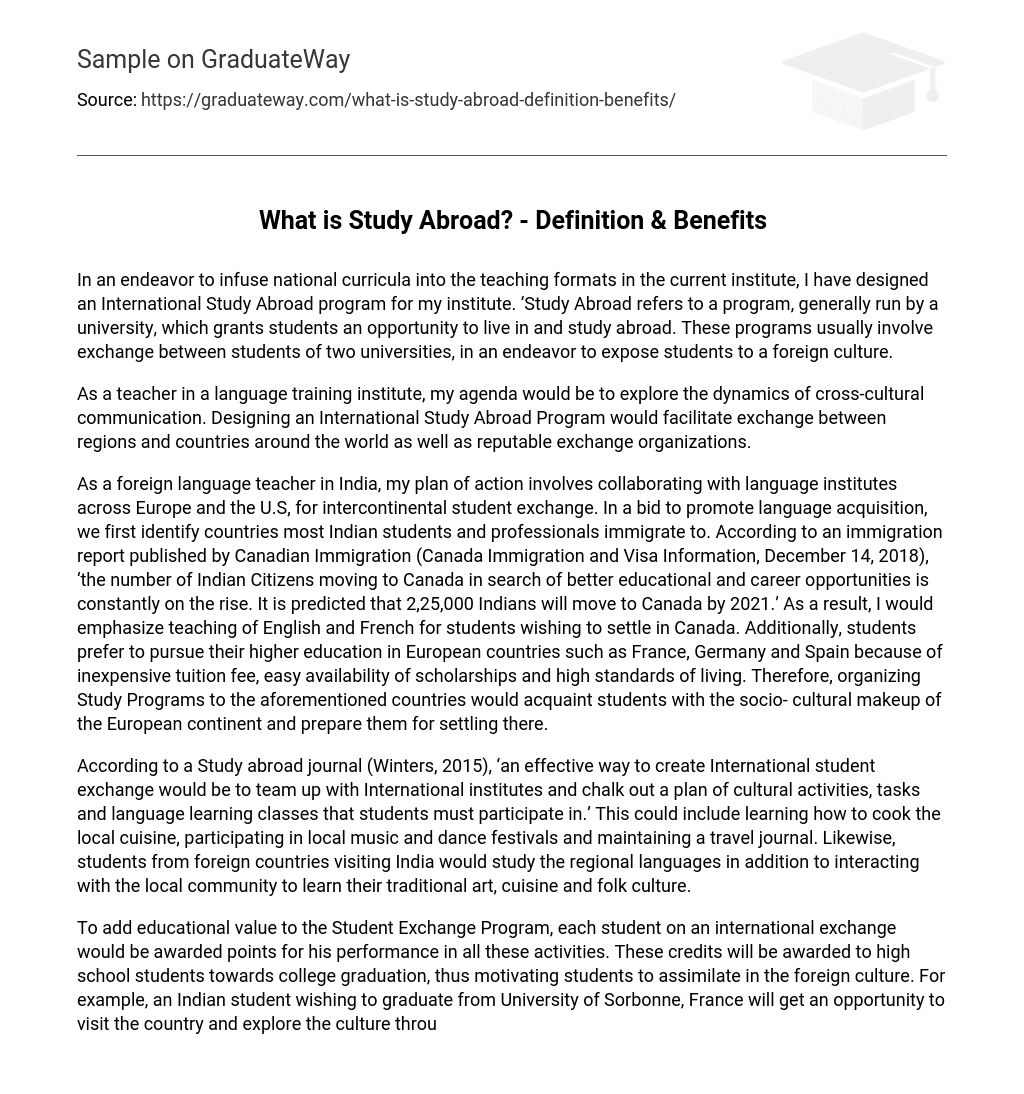In an endeavor to infuse national curricula into the teaching formats in the current institute, I have designed an International Study Abroad program for my institute. ‘Study Abroad refers to a program, generally run by a university, which grants students an opportunity to live in and study abroad. These programs usually involve exchange between students of two universities, in an endeavor to expose students to a foreign culture.
As a teacher in a language training institute, my agenda would be to explore the dynamics of cross-cultural communication. Designing an International Study Abroad Program would facilitate exchange between regions and countries around the world as well as reputable exchange organizations.
As a foreign language teacher in India, my plan of action involves collaborating with language institutes across Europe and the U.S, for intercontinental student exchange. In a bid to promote language acquisition, we first identify countries most Indian students and professionals immigrate to. According to an immigration report published by Canadian Immigration (Canada Immigration and Visa Information, December 14, 2018), ‘the number of Indian Citizens moving to Canada in search of better educational and career opportunities is constantly on the rise. It is predicted that 2,25,000 Indians will move to Canada by 2021.’ As a result, I would emphasize teaching of English and French for students wishing to settle in Canada. Additionally, students prefer to pursue their higher education in European countries such as France, Germany and Spain because of inexpensive tuition fee, easy availability of scholarships and high standards of living. Therefore, organizing Study Programs to the aforementioned countries would acquaint students with the socio- cultural makeup of the European continent and prepare them for settling there.
According to a Study abroad journal (Winters, 2015), ‘an effective way to create International student exchange would be to team up with International institutes and chalk out a plan of cultural activities, tasks and language learning classes that students must participate in.’ This could include learning how to cook the local cuisine, participating in local music and dance festivals and maintaining a travel journal. Likewise, students from foreign countries visiting India would study the regional languages in addition to interacting with the local community to learn their traditional art, cuisine and folk culture.
To add educational value to the Student Exchange Program, each student on an international exchange would be awarded points for his performance in all these activities. These credits will be awarded to high school students towards college graduation, thus motivating students to assimilate in the foreign culture. For example, an Indian student wishing to graduate from University of Sorbonne, France will get an opportunity to visit the country and explore the culture through a three- month student exchange program organized by our institute. As a partner institute, University of Sorbonne will design a French language and civilization learning program for the student, catered to his current and future needs as an international student. Based on the student’s performance in all tasks, activities and language programs designed by Sorbonne, he will be awarded credits for his higher education at the institute. This will be an effective strategy in introducing the student to the institute and the French culture before he becomes a long-term student. Earning credits for good performance will also motivate the student to get acquainted with the French civilization.
To provide an in-depth knowledge of available institutes, courses and career opportunities, international teacher seminars will be organized. They will comprise lectures by academic staff from the partner universities besides language support. This will cater to the needs of hundreds of aspiring students and professionals wishing to settle abroad. It will be an excellent platform for both teachers and students to promote their institute and ask their queries respectively.





